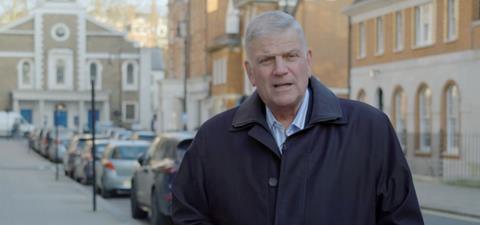Some evangelical leaders in the UK are said to have quietly urged his ministry to send a different preacher instead. But those who believe the nation needs to hear a strong gospel message about repentance and faith in Jesus are excited to welcome the evangelist. Sam Hailes reports

Fresh from a string of legal victories against the venues who tried to cancel him, Franklin Graham has announced a new tour of the UK.
The ‘God Loves You Tour’ will see the outspoken US evangelist hold free events at large venues in Liverpool, Newport, Sheffield and London between May and July 2022.
In media interviews, Graham is keen to emphasise his “message of love”. But his detractors outside of the Church view Franklin’s past comments on LGBT issues as extremely unloving. There have been criticisms from fellow believers too – especially around his outspoken public backing of Donald Trump.
Tour organisers, the Billy Graham Evangelistic Association (BGEA), say they only minister where they’re invited. And its true that plenty of church leaders in the UK will welcome the rescheduled tour. Others, including some CofE bishops, are likely to oppose his visit, as they did in 2020, when all eight UK venues cancelled the bookings.
Those cancellations took place after a number of LGBT groups petitioned venues, citing concerns that Graham’s appearance would stoke division. Then, as the Covid-19 pandemic worsened, the BGEA postponed the tour while it pursued “a legal resolution” with the venues which they said had broken “their legally-binding contracts with us because we…stand uncompromisingly on traditional Biblical beliefs about human sexuality, and share with all people that Jesus Christ is the only way they can be forgiven of sin.”
It’s clear Graham believes his legal fights (some of which are still ongoing) could set an important precedent for future Christian events. He is fighting his cases against the venues on the grounds of religious freedom and free speech, arguing Christian preachers are protected by UK law and should be able to preach the gospel without interference. So far, so good. Sheffield City Council have confirmed they will now host the speaker after the BGEA took legal action against them for their earlier breach of contract. The BGEA say that, contrary to the claims of activists and campaigners, there was no evidence that any event involving Mr Graham “has ever caused a danger to public safety or incited public disorder”.
Graham believes his legal fights could set an important precedent for future Christian events
And that’s not the only legal victory they’ve been celebrating. Earlier this year, the BGEA was awarded over £100,000 in damages after adverts for Graham’s ‘Festival of Hope’, event in Blackpool were unlawfully banned from being displayed on the town’s buses. Judge Claire Evans of Manchester County Court ruled “overwhelmingly” in favour of Graham and the festival, stating that the Council’s actions in removing the adverts were “the antithesis of the manner in which a public authority should behave in a democracy”.
Your own reaction to Franklin Graham will likely be determined by your church background and theological beliefs. Many progressive or liberal Christians who believe God approves of committed, monogamous same-sex relationships won’t be in a hurry to welcome him. For some of them, Graham’s message cannot even be described as “Christian”. But more traditional or conservative Christians - who say evangelism requires the preaching of a bold message which calls on every person to repent and turn to Jesus - are likely to support the tour. Others may applaud his gospel message but fear his outspoken backing of Trump has lost him a hearing among many in the UK.
The spiritual climate of the UK has shifted significantly since Billy Graham first spoke here in the 1950s. It is notable that, while Franklin’s father learned to keep his politics to himself so that he might win a hearing from Republicans and Democrats alike, his son has followed a very different path. This has led to accusations of using Christianity “as a weapon of political division” by some US church leaders and high levels of criticism and ridicule from parts of the mainstream media. As a result, some evangelical leaders are said to have privately urged the BGEA to reconsider their proposed events. Sometimes the perceived problem is the methodology of large scale preaching events (can they still work in our increasingly secular society? Isn’t Alpha or friendship evangelism much more successful?) but, more often, the objection is Franklin himself. There are other members of the Graham family who preach. Billy Graham said his daughter Anne was “the best preacher in the family”. Why not her?
One rebuttal to that question is that Franklin – for good or ill – does have a much larger public profile, and is therefore likely to draw a larger crowd. Hundreds of churches up and down the country are currently engaging in Operation Christmas Child (OCC) – a project of Samaritan’s Purse (headed up by Franklin) which delivers a shoebox filled with gifts to impoverished children around the world. You may not agree with everything he stands for, his supporters admit, but he’s preaching the gospel in both word and deed through projects like OCC, they argue. Can’t we get behind that?
The arrival of Franklin to these shores will reignite the debate about the best way to share God’s love with a sceptical world. But before we jump to criticise those whose evangelistic methods differ from our own, its perhaps worth heeding the words of another American preacher, the late DL Moody. He once told a critic: “It is clear you don’t like my way of doing evangelism. You raise some good points. Frankly, I sometimes do not like my way of doing evangelism. But I like my way of doing it better than your way of not doing it.”




































